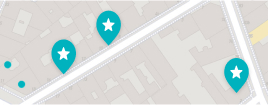KOH KER
Temple at Koh Ker, the improvised capital of Jayavarman IV, consisting of 18 shrines distributed along the Khmer causeway
According to the inscriptions engraved on the pedestals of the tower of Baksei Chamkrong, in Angkor, the usurper Jayavarman IV, uncle of the young king Içanavarman, did not appreciate the rather too epicurean behavior of his nephew. Proclaiming himself king in his turn, he went 100 km from Angkor, with brahmins and servants, to found a new capital called Chok Gargyar, the present Koh Ker. Koh Ker must therefore be understood as a reactionary city, a city of good morals as opposed to the Sodom and Gomorrah that Angkor had apparently become at the time.
The good king Jayavarman IV was in fact crowned twice, the first by his own hand (one is never so well served as by oneself...), the second, quite legitimately, at the death of his merry nephew in 928... He remained faithful to Chok Gargyar where he died in 942.
His son Hashavarman succeeded him for two years before dying in his turn and being replaced by a brother-in-law, Rajendravarman, who abandoned Koh Ker to return to Angkor where he transcended his father-in-law's style by building new monumental constructions such as Pre Rup (the last temple-mountain) and the Eastern Mebon. Koh Ker will continue to be inhabited until the 11th century.
The stewardship being assured, it only remained for the usurper to start building! Tribhuvaneçvara, the deity to whom Koh Ker was finally dedicated, would guide his arm. The improvised capital of Jayavarman IV has no less than 18 sanctuaries spread out from Rahal along the Khmer causeway that links it to Beng Mealea. The first sanctuaries that can be seen coming from the latter temple are Prasat Pram, Prasat Damrei and Prasat Chen along the road. Prasat Thom, formerly Lingapura, is the main temple of Koh Ker, located not far from the northwest corner of the Rahal, it consists of three distinct entities: the sanctuary, the prang (pyramid) and the outer buildings. The sanctuary and the prang are enclosed within the same enclosure, but are separated by an inner wall with a small gopura
for circulation.The temple is entered through a beautiful shrine-like entrance decorated with large sandstone-framed windows and carved lintels, which leads into the third enclosure onto a paved roadway framed by two galleries whose pillars once supported a wooden roof. On either side are sandstone basins with naga-shaped
coping.The second enclosure is pierced at both ends by beautiful gopuras illuminated by balustrade windows. It is quickly followed by the last enclosure giving access to the sanctuary through two other gopuras
situated in the same way, each at one end of the enclosure.In the center of the sanctuary rises a terrace where are placed, in parallel lines, twelve remains of small square brick monuments that formed the heart of the temple, facing the terrace, the remains of libraries.
One then arrives in the courtyard of the Prang, a gigantic seven-story pyramid with sandstone facings that measures 55 m on each side and more than 40 m in height. A staircase in the middle of each face served the different floors. At the top of the pyramid rested "a linga of 9 Carva, placed at a height of 9 times 9 cubits, with the images of Brahma and other gods". From there, the view is superb and embraces the whole horizon.
Did you know? This review was written by our professional authors.
Book the Best Activities with Get Your Guide
Members' reviews on KOH KER
The ratings and reviews below reflect the subjective opinions of members and not the opinion of The Little Witty.
Find unique Stay Offers with our Partners


